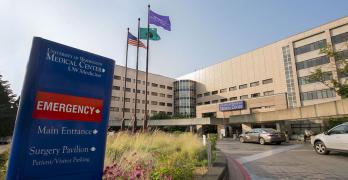Allergy & Immunology
Evaluation, diagnosis and treatment of allergies, asthma and immune disorders

Get relief from allergy and immune disorders, from the common to the complex.
Highest Standard
Our clinical expertise in treating a wide range of simple and complex allergic, immune and autoimmune disorders is based on decades of training and the latest research.
The Forefront of Care
Our specialists are leading the way with new treatment methods, such as biologic therapy for asthma, sinusitis and immunological conditions.
All-Around Relief
We work across disciplines and teams to deliver great results and improve quality of life. We don’t just treat symptoms and conditions, we treat the whole you.
Some of our common services:
This is a reaction that occurs in the eyes, nose and throat in response to airborne allergens. Symptoms include nasal congestion and itchiness, sneezing, scratchy throat, nosebleeds and tiredness. Our specialists can develop an individualized treatment plan for this condition that might include medication, allergy shots and, in some cases, surgery.
If you have hay fever (allergic rhinitis), eye allergy (conjunctivitis), allergic asthma or a stinging insect allergy, you might benefit from allergy immunotherapy. Our specialists administer a specific mixture of the substance that you're allergic to in order to help your immune system become less sensitive to it over time.
We offer blood and skin tests for hundreds of environmental, food and drug allergens specific to your symptoms. Through genetic testing for immunodeficiencies and blood testing for autoimmune and immune dysregulatory conditions, we can help you identify the root cause of systemic conditions that present multiple, related symptoms.
This is the most severe kind of allergic reaction you can have. Common triggers are penicillin, bee stings, aspirin, eggs and nuts. Symptoms include hives, constriction of your airways and swollen tongue. Anaphylaxis requires immediate medical attention. Once you're feeling better, our allergists can help diagnose and manage your allergies and prescribe life-saving medication.
This is condition of swelling in the deeper layers of skin that can occur with or without hives. It can occur at any part of your body but most commonly on the lips, tongue, face, hands and feet. Angioedema can be allergic or non-allergic. Angioedema may need immediate medical attention, especially if there is swelling of the tongue, lips and/or throat, which can make it difficult to breathe.
This is a long-term disease of the airways of the lungs, in which the airways become sensitive to allergens and irritants. As a result, they can narrow, making breathing harder. Our specialists are highly skilled at diagnosing and treating mild, moderate and severe asthma using traditional and leading-edge techniques like biologic therapy.
This is a reaction that can happen after your skin comes into contact with certain substances, such as allergens or irritants. Symptoms can include itching, redness and inflammation. Contact dermatitis can look like other skin conditions, so it's important to get an accurate diagnosis. Our allergists are experts at identifying this condition and helping you manage it.
This type of allergy occurs when your body's immune system overreacts to medication that would otherwise be safe. Symptoms might include immediate vs. delayed skin rash, angioedema, itching or anaphylaxis, which is a severe form of reaction that can present as shortness of breath, wheezing, throat closing, vomiting and low blood pressure. The primary treatment is avoidance, but our allergy specialists can help you identify your triggers and prescribe life-saving medication in case of a reaction.
Eczema is a genetic condition that presents as dry skin. It typically starts during childhood but can also occur during adulthood. Childhood eczema is sometimes associated with food allergies and allergy testing can be helpful. Our specialists will help you with a skincare regimen that can improve the skin as well as identify whether you have food allergies.
This type of allergy occurs when your body's immune system overreacts to something in the environment that would otherwise be harmless, such as dust mites, pollen, trees, grasses, pet dander and mold. Symptoms include nasal congestion, sneezing and itchy, watery eyes. Our allergy specialists have decades of experience diagnosing and treating environmental allergies.
This type of allergy occurs when your body's immune system overreacts to food that would otherwise be harmless. Symptoms might include hives, angioedema, asthma, trouble breathing, vomiting, diarrhea and anaphylaxis. The primary treatment is avoidance, but our allergy specialists can help you identify your food triggers and prescribe life-saving medication in case of a reaction.
Your immune system is your body's defense against infections and other harmful invaders. If you have an immunological condition, it means that your immune system doesn't work the way it should. For example, it might be compromised or too active. Our immunologists are highly trained in evaluating and treating all types of immune disorders.
Eosinophils are a type of white blood cell that helps fight off infections. If you have an infection or disease, too many eosinophils can sometimes build up in organs and tissues, causing inflammation, digestive issues, and other symptoms. Our immunologists can identify this condition and help control it using the latest treatments.
Immunodeficiency disorders hamper your body's ability to fight infections and diseases. They occur when part of the immune system is either absent or not functioning properly, and can be either genetic or acquired. Our immunologists are highly trained in diagnosing, treating and managing these disorders with leading-edge medications and other therapies.
This is a rare, chronic disease in which too many mast cells accumulate in the skin, bone marrow or internal organs. Because mast cells are a type of immune cell that produces histamine, this condition can cause severe allergic reactions and other problems. Our immunologists can identify mastocytosis and help manage it using the latest medications and therapies.
Inform yourself to make the best choices for your health and care with UW Medicine patient education resources.
Support is an important part of your care beyond treatment. Support groups and community resources can help you and your loved ones through your medical journey and recovery.
This occurs when you're stung by an insect such as a bee or wasp and have an abnormal reaction. Common symptoms include localized swelling and redness, but there can also be severe symptoms with hives all over the body, swelling of the throat and tongue, trouble breathing, vomiting or dizziness. Our allergy specialists can expertly diagnose this condition and help you manage it with it immunotherapy and other methods.
This is a condition in which red, itchy, raised areas occur on the skin. It can last for a short period of time or be chronic. If hives are acute the cause is often an allergic reaction to certain foods, medications or an insect sting. Chronic hives may not be related to allergies but can sometimes be related to underlying immune disorders. If you experience hives, our allergists can help diagnose and treat any underlying allergies and other conditions.
Convenient care, in your neighborhood.
Allergy and Inflammation at Harborview
Medical Specialty
Hours Today
Appointments
Allergy Clinic at Eastside Specialty Center
Medical Specialty
Hours Today
Appointments
Allergy, Asthma and Immunology Clinic at UW Medical Center - Montlake
Medical Specialty
Hours Today

Should I go to the emergency room or urgent care?
If you have an illness or injury that you think may be life-threatening without immediate care, call 911 or go to the nearest emergency room.
If you have an illness or injury that is not life-threatening but needs attention today, go to urgent care.


